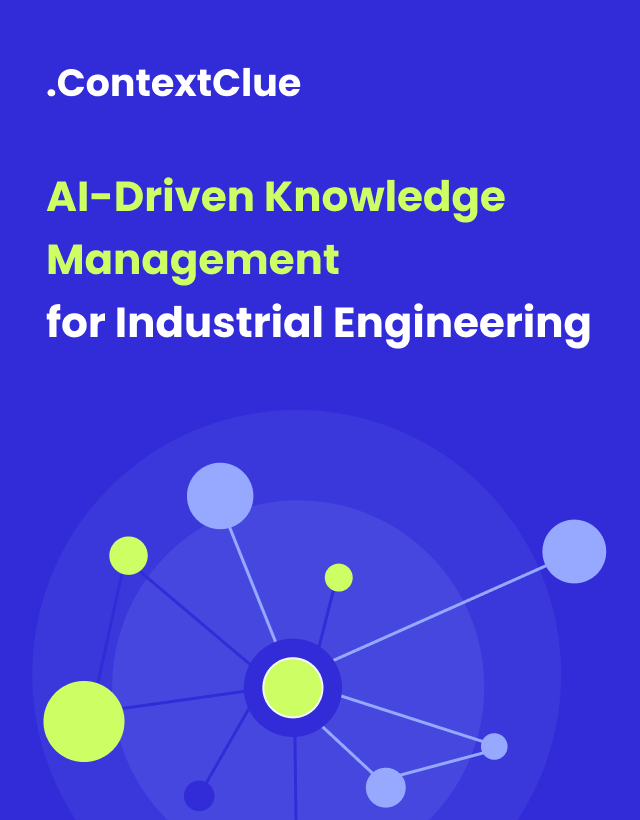
June 17, 2025
Top 11 AI Consulting Companies with Proven Manufacturing Track Records
Author:

Reading time:
13 minutes
Artificial intelligence has become the buzzword that instantly elevates any pitch deck, promising transformative innovation that clients are often expected to trust blindly. However, the reality of AI implementation tells a different story – one where technological sophistication doesn’t automatically translate to business value.
The truth is that innovation cannot be purely technological. It must be affordable, business-wise, and pragmatically valuable to deliver real impact. Yet this pragmatic approach remains a minority position as AI continues to be viewed as a shiny object that will magically solve business problems. The disconnect between AI hype and practical implementation has created a landscape where many organizations invest heavily in sophisticated solutions that fail to address core business needs or provide measurable returns.
This is why finding the right collaborator becomes critical – partners who can fluently navigate the AI landscape while consistently choosing tools that meet business objectives in the most optimized and affordable ways. The challenge intensifies in manufacturing, where AI implementation is inherently tailored and requires deep domain expertise combined with close collaboration between technology specialists and subject matter experts.
Selecting a partner with proven industry experience provides significant practical benefits. Industry-specialized consultants bring previous project learnings that can dramatically reduce development timelines. They often have developed proprietary frameworks, boilerplate solutions, or even product components that, after customization efforts, can be readily deployed rather than built from scratch.
This analysis examines ten AI consulting companies that have demonstrated measurable success in manufacturing environments, not through marketing promises, but through documented client relationships, quantifiable project outcomes, and specialized domain expertise in industrial applications.
Full transparency: This analysis includes Addepto among the featured consulting companies, and we openly acknowledge this is an opportunistic way of highlighting our own manufacturing expertise. While we hope our documented work with companies like Jabil and Woodward, along with our ContextClue product development, provides a justification for this inclusion, we recognize this represents a clear bias in our analysis. This is why we’d like to emphasize that the order of companies in this list is randomized, and all featured companies genuinely deserve recognition for their proven manufacturing AI implementations. Our primary goal is to provide valuable industry insights while being completely transparent.
Key Takeaways
- Predictive maintenance delivers the highest proven ROI and fastest implementation
- Legacy system integration is the real challenge, not AI algorithms
- Manufacturing-experienced partners reduce implementation time by 30-50%
- “Out-of-the-box” solutions rarely work without extensive consulting and customization
Why Manufacturing AI Implementation Is So Challenging
The manufacturing sector encompasses over 20 distinct sub-industries, each presenting unique technical, regulatory, and operational requirements that make AI implementation extraordinarily complex. According to CIO Dive research, approximately 80% of AI projects fail to deliver expected outcomes, with Amper reporting that only 8.2% of manufacturers are successfully scaling AI implementations today.
The Scale of Manufacturing Complexity
Manufacturing “sub-sectors” range from automotive and aerospace to chemical processing, pharmaceuticals, electronics, textiles, food production, etc., and each sector brings distinct challenges – automotive manufacturing faces real-time quality control demands, pharmaceutical companies navigate FDA validation requirements, and food processors must maintain strict traceability protocols.
Data Quality and Integration
Manufacturing facilities typically struggle with data silos across departments, inconsistent formats, and legacy system incompatibility. Supply Chain Brain research shows 47% of manufacturers view data fragmentation as a major obstacle, while McKinsey Digital reports many organizations lack production-ready data pipelines for integrating sensor data with enterprise systems.
Legacy System
Supply Chain Brain reports that approximately 65% of manufacturers rely on outdated systems not designed for modern AI technologies. According to ITS OLI research, legacy integration can increase project costs by 40-60%, with performance bottlenecks creating fundamental disconnects between AI computational requirements and existing infrastructure capabilities.
Skills Gap Crisis
The World Economic Forum reports that 54% of manufacturing workers will need significant upskilling by 2025. VKS App analysis shows the sector already faces mass retirements of experienced workers, compounding the challenge of finding personnel capable of managing AI applications in factory settings.
Financial Reality Check
Forbes Tech Council reports AI implementation typically requires $50,000 to $300,000+ for initial deployment, with Hype Studio finding hidden infrastructure expenses adding another 30-50%. Process Excellence Network research shows only 25% of AI initiatives have delivered expected ROI in recent years, while Supply Chain Brain indicates 40% of manufacturers avoid AI integration due to unclear returns.
Production Downtime Risks
Manufacturing operations require continuous production, making AI implementation risky due to potential system failures. Dozuki research indicates this risk aversion often leads to conservative approaches that limit deployment scope and effectiveness.
AI Consulting Companies with Proven Manufacturing Track Records
Addepto
Addepto demonstrates manufacturing expertise through documented case studies including a product traceability system for electronics manufacturer Jabil and predictive AI modules for aerospace company Woodward that achieved 30% reduction in manual work and 25% decrease in operational costs.
Read more: Addepto’s case studies
Their proprietary ContextClue product addresses manufacturing’s technical documentation challenges by creating unified knowledge graphs from CAD drawings, technical manuals, and production specifications. ContextClue integrates with PLM, ERP, and CAD systems, enabling engineers to access critical information across previously disconnected systems through natural language queries.

InData Labs
InData Labs maintains an active consulting relationship with a substantial manufacturing organization employing over 5,000 people in Fort Wayne, Indiana. Their engagement focuses on model strengthening and feature engineering optimization for existing AI implementations.
Recent client testimonials from October 2024 highlight InData’s capability to enhance analytical systems and optimize model performance. This ongoing relationship demonstrates their ability to work within complex manufacturing environments and deliver sustained value to large-scale operations.

Statworx
This German consulting firm has established deep expertise in automotive manufacturing through a comprehensive data integration project with a leading automotive manufacturer. Statworx developed a standardized framework based on Medallion Architecture, successfully integrating data from more than ten sources into a unified data lakehouse.
The implementation includes automated testing protocols, CI/CD pipelines, and a dedicated Data Quality Dashboard. These components enable faster decision-making processes and improved production scheduling—critical capabilities in automotive manufacturing where timing precision directly impacts profitability.

Markovate
Markovate’s work with a global electronics manufacturer produced quantifiable improvements in production quality and efficiency. Their computer vision solution reduced error rates by 40% while increasing production speed by 25%.
These results demonstrate Markovate’s understanding of electronics manufacturing processes and their ability to implement AI solutions that deliver measurable business impact. The dual improvement in both quality and speed represents a sophisticated implementation that addresses competing manufacturing priorities.

DataToBiz
DataToBiz provides comprehensive AI strategy consulting specifically for automotive manufacturing companies. Their approach centers on demand forecasting and predictive maintenance implementation, with AI-driven analytics platforms designed to optimize production schedules and inventory management for major industrial manufacturers.
Client testimonials emphasize both technical competency and commitment to delivering measurable business outcomes, indicating a results-focused consulting approach.

Cleartelligence
Cleartelligence differentiates itself through exclusive focus on manufacturing data and AI consulting. Working with multiple industrial manufacturers, they develop predictive maintenance dashboards and production scheduling optimization systems that integrate data from shop floor operations to executive-level reporting.
Their dedicated focus on manufacturing intelligence positions them as specialists rather than generalist consultants, providing deep vertical expertise in industrial applications.

LeewayHertz
LeewayHertz has developed proven expertise in heavy machinery applications through predictive maintenance platform implementations. Their solutions integrate Industrial IoT sensors with machine learning algorithms to predict equipment failures before they occur.
This specialization in heavy machinery represents significant technical expertise, as these environments involve complex mechanical systems where prediction accuracy directly impacts operational continuity and cost control.

NeuroSYS
NeuroSYS brings specialized knowledge to metallurgical applications, working with the steel industry and metal products manufacturers. They implement computer vision systems for real-time defect detection and develop demand forecasting models that optimize inventory levels.
Their technical expertise extends to factory audits and process optimization, specifically tailored for heavy industry applications. This combination of computer vision technology and industry-specific process knowledge demonstrates comprehensive manufacturing expertise.

Cambridge Consultants
Cambridge Consultants demonstrates proven capability through their collaboration with Hitachi on IoT solutions for logistics optimization. This partnership achieved operational efficiency improvements and contributed to Hitachi’s growth objectives through intelligent system integration.
Their extensive product development experience and systems engineering expertise enable comprehensive IoT implementations for manufacturing clients, with particular strength in complex system integration projects.

Alpha Apex Group
Alpha Apex Group focuses exclusively on manufacturing and industrial automation consulting. They implement smart factory solutions and process automation systems that enhance productivity and improve quality control processes across manufacturing operations. Their approach emphasizes technology integration and optimization across the entire manufacturing value chain, from raw material processing through finished product delivery.
Using AI in Manufacturing
Predictive Maintenance Leadership
Four companies demonstrate proven capabilities in equipment optimization and downtime reduction, making predictive maintenance the most prevalent specialization. This focus reflects the significant ROI potential in preventing unplanned equipment failures across diverse manufacturing environments.
Computer Vision Applications
AI-driven quality control through computer vision represents a mature application area, with companies like Markovate achieving substantial error reduction in electronics manufacturing. Real-time defect detection capabilities are particularly valuable in high-volume production environments, offering immediate feedback loops that traditional manual inspection processes cannot match.
Generative AI Integration
Manufacturing operations are increasingly leveraging generative AI tools for process optimization, documentation automation, and intelligent troubleshooting. These solutions excel at analyzing complex operational data to generate maintenance schedules, optimize production parameters, and create real-time operational guidance that adapts to changing conditions.
Data Integration and Legacy System Challenges
The manufacturing landscape presents unique complexity through its ecosystem of interconnected legacy systems, proprietary equipment interfaces, and hybrid manual-automated processes. Many facilities operate with a patchwork of systems developed over decades – some connected through custom integrations, others operating in complete isolation. This fragmented infrastructure creates significant data silos where critical production information remains trapped in individual systems or, more commonly, exists only in manual processes and tribal knowledge.
Companies like Statworx demonstrate how comprehensive data integration creates the foundation for advanced AI applications, but the reality is that most manufacturers face substantial challenges in achieving this integration. Legacy programmable logic controllers (PLCs), decades-old manufacturing execution systems (MES), and custom-built quality management databases often lack modern APIs or standardized data formats. Meanwhile, many critical processes still rely on manual data entry, paper-based tracking, or operator expertise that has never been systematized.
This technological fragmentation means that “out-of-the-box” AI solutions rarely deliver immediate value. Each implementation requires significant consulting work to bridge the gaps between systems, digitize manual processes, and create the data infrastructure necessary for AI algorithms to function effectively.
The Strategic Advantage of Top AI Manufacturing Companies
Successfully implementing AI in manufacturing environments demands partners who understand both the technical complexity of legacy system integration and the operational realities of production environments.
Experienced AI consultants bring proven methodologies for navigating the challenges of data extraction from disparate sources, creating unified data and AI models that respect existing workflows, and designing AI platforms that can operate within the constraints of established manufacturing processes.
The consulting phase is not just preparation – it’s the foundation that determines success or failure. Manufacturers who choose AI partners with deep manufacturing experience typically see faster implementation timelines, fewer integration roadblocks, and more sustainable long-term results.
These experienced partners understand that effective industrial AI isn’t about deploying the most sophisticated AI and machine learning algorithms, but about creating practical and scalable AI systems that work within the complex reality of modern production environments.
Frequently Asked Questions: AI for Manufacturing Industry
Q: Why don’t standard AI solutions work in manufacturing?
A: Manufacturing environments are characterized by decades-old legacy systems, custom integrations, and hybrid manual-automated processes. Standard AI solutions assume clean, accessible data and modern system architectures that rarely exist in real manufacturing facilities.
Q: How long does it typically take to implement AI in manufacturing?
A: Implementation timelines vary significantly based on system complexity and data readiness. Companies with experienced manufacturing AI partners typically see 30-50% faster implementation compared to those working with general AI consultants who must learn manufacturing-specific challenges on the job.
Q: What’s the biggest obstacle to AI adoption in manufacturing?
A: Data integration and system connectivity challenges far exceed algorithm complexity. Most manufacturing facilities have critical data trapped in isolated systems or existing only in manual processes and operator knowledge.
Q: Should we prioritize predictive maintenance or computer vision first?
A: Predictive maintenance typically offers clearer ROI and faster implementation since it often requires less system integration than computer vision quality control systems. However, the best starting point depends on your specific operational pain points and data accessibility.
Q: How do we evaluate an AI partner’s manufacturing experience?
A: Look for partners with proven experience in legacy system integration, MES/ERP connectivity, and PLC data extraction. Ask for specific case studies involving similar manufacturing environments and system architectures to yours.
Q: What role does generative AI play in manufacturing?
A: Generative AI excels at process optimization, automated documentation, and intelligent troubleshooting. It’s particularly valuable for analyzing complex operational data and generating actionable insights that adapt to changing production conditions.
Category:






